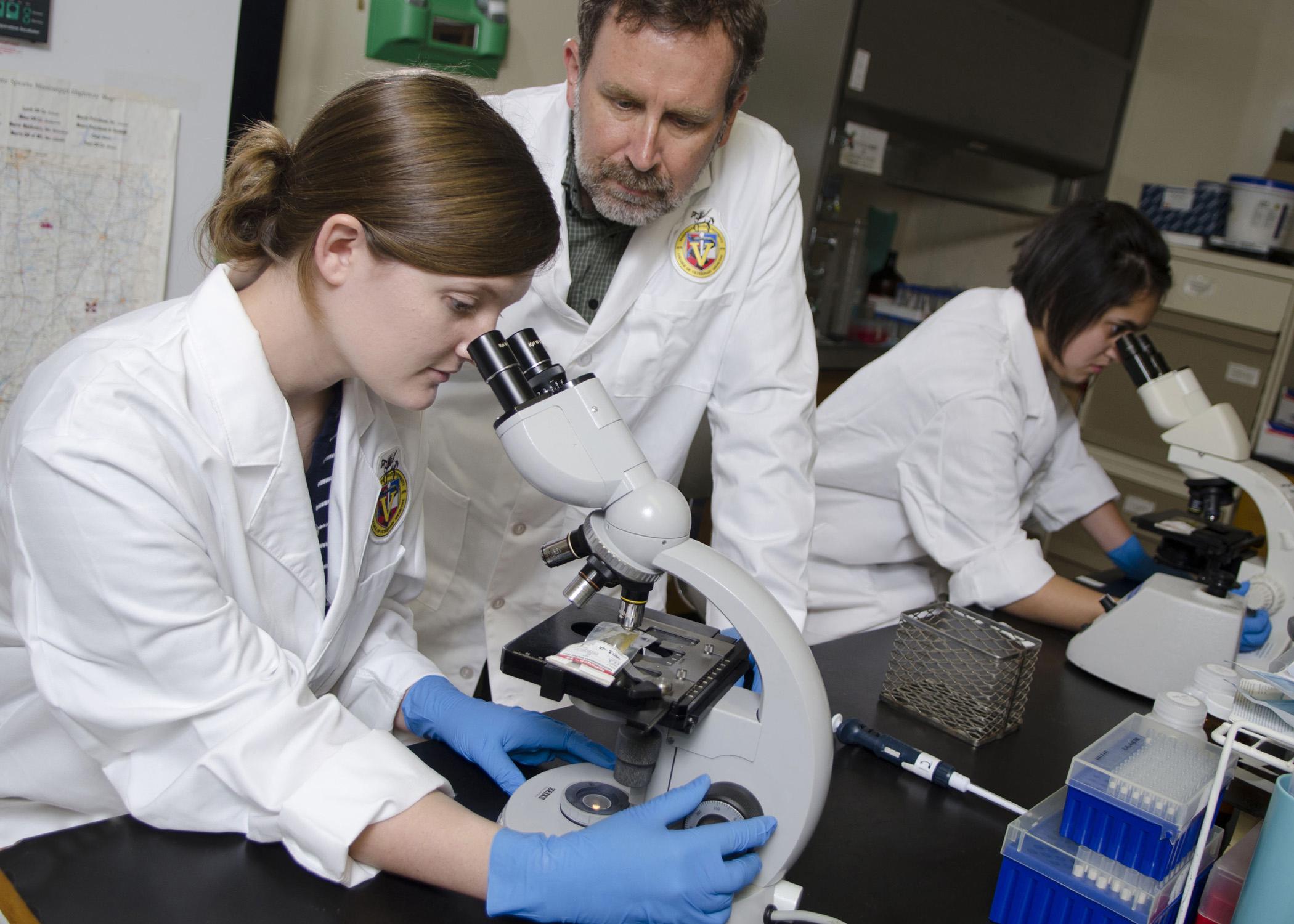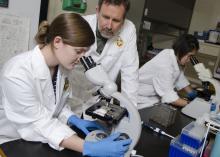Information Possibly Outdated
The information presented on this page was originally released on June 5, 2013. It may not be outdated, but please search our site for more current information. If you plan to quote or reference this information in a publication, please check with the Extension specialist or author before proceeding.
Research program shows students diverse careers
MISSISSIPPI STATE -- When veterinarian Dr. Alicia Olivier arrives for work every day, she isn’t greeted by wagging tails and nervous meows. Instead, she spends her days behind a microscope to help better understand disease processes and therapy development.
Olivier is a member of a diverse set of veterinary scientists who conduct a variety of biomedical research that impacts animal and human health.
“Veterinarians are ideal candidates for research careers,” said Dr. Mark Lawrence, associate dean for research and graduate studies at Mississippi State University’s College of Veterinary Medicine. “They study many different species and have the ability to see the bigger picture because they have studied comparative medicine. It is not uncommon for graduate veterinarians to end up doing research related to human medicine.”
Lawrence co-directs the college’s Summer Research Experience Program with Dr. Jeffrey Eells, associate professor in the college’s Basic Science Department. The program introduces first- and second-year veterinary medicine students to the wide variety of research fields available to them.
The 12-week program pairs the students, who attend both MSU’s College of Veterinary Medicine and other veterinary schools in the country, with faculty mentors in the student’s area of interest. After students choose a specific research project, they formulate a plan, conduct research, analyze the results and present their findings at a national symposium.
Olivier chose her career track largely because of her involvement in the summer research program.
“I had an interest in research before veterinary school, but I didn’t quite know how that would fit with being a veterinarian,” said Olivier, a comparative pathologist who studies animal models of human diseases at the University of Iowa’s Carver College of Medicine. “It wasn’t until I started veterinary school that I learned about the numerous research opportunities that were available to veterinarians in various career paths.”
Awareness of the field and the opportunity to discover the field in a hands-on environment are important for students.
“Whether or not the students choose to pursue research as a career or not, they all develop an appreciation and understanding of research,” Lawrence said. “But for some, the program will impact their career choice, leading them to either pursue research as the major focus or include it as an important aspect.”
The program also helped Dr. Camille Harris discover her career passion. Her interest in diseases that can cross between humans and wildlife led her to practice clinical wildlife medicine. She is currently investigating the impact of environmental changes on La Crosse encephalitis, a virus native to temperate hardwood forests and the leading cause of viral pediatric encephalitis in the U.S.
“When people think of veterinarians, they picture a small animal veterinarian giving vaccines,” said Harris, a 2004 MSU College of Veterinary Medicine graduate who is a doctoral candidate in disease ecology at Virginia Tech. “Rarely do they consider there are veterinary scientists studying animal and human diseases in basic and applied research.”
Veterinary researchers are in high demand, according to an article in the spring 2009 edition of The Journal of Veterinary Medical Education. Need is expected to continue to increase as new diseases and challenges surface in veterinary medicine, Lawrence said.
Now in its 13th year, the summer research program makes a significant contribution to animal and human medicine. Approximately 27 percent of the program’s alumni are now working in research or academia, pursuing graduate degrees or receiving advanced clinical training.
“The program’s success is based on its structure,” Lawrence said. “We find the best and brightest students to admit to the program and couple them with our dedicated and productive faculty mentors who share their time and expertise and offer students valuable career advice.”
Grants from the National Institutes of Health, the Merial Veterinary Scholars Program and MSU’s College of Veterinary Medicine fund the summer research program.
Contact: Karen Templeton, (662) 325-1100




